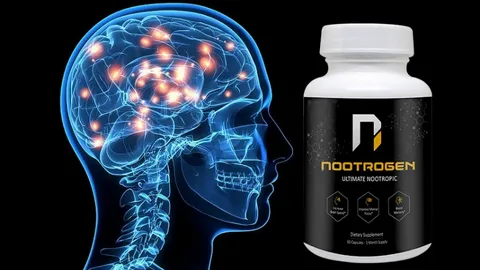Nootropics, also known as “smart drugs” or cognitive enhancers, have gained popularity for their potential to improve cognitive function, enhance memory, and boost learning capabilities. This guide will explore the various types of nootropics, their benefits, and how they can be used to enhance learning.
Understanding Nootropics
What Are Nootropics?
Nootropics are a class of substances that can improve brain performance. They are often used to enhance memory, focus, creativity, and overall cognitive function. Nootropics can be natural or synthetic and are commonly used by students, professionals, and anyone looking to improve their mental performance.
Types of Nootropics
There are several types of nootropics, each with different mechanisms of action and benefits. Some of the most popular categories include:
Natural Nootropics
- Herbs and Plants: Examples include Ginkgo Biloba, Bacopa Monnieri, and Rhodiola Rosea.
- Amino Acids: Such as L-Theanine and Acetyl-L-Carnitine.
- Vitamins and Minerals: Including Vitamin B6, B12, and Magnesium.
Synthetic Nootropics
- Racetams: Such as Piracetam, Aniracetam, and Oxiracetam.
- Choline Supplements: Including Alpha GPC and Citicoline.
- Prescription Medications: Such as Modafinil and Adderall, which are often used off-label for cognitive enhancement.
Benefits of Nootropics for Learning
Enhanced Memory and Recall
One of the primary benefits of nootropics is their ability to improve memory and recall. This is particularly beneficial for students and professionals who need to retain and recall large amounts of information.
Increased Focus and Concentration
Nootropics can help increase focus and concentration, allowing individuals to stay on task for longer periods. This is especially useful during study sessions or when working on complex projects.
Improved Cognitive Function
Many nootropics have neuroprotective properties, which can help protect the brain from age-related decline and improve overall cognitive function. This can lead to better problem-solving skills, enhanced creativity, and faster learning.
Reduced Mental Fatigue
Nootropics can help reduce mental fatigue, allowing individuals to maintain high levels of productivity throughout the day. This can be particularly useful during periods of intense study or work.
How to Choose the Right Nootropics
Identifying Your Goals
The first step in choosing the right nootropic is to identify your goals. Are you looking to improve memory, increase focus, or boost overall cognitive function? Understanding your goals will help you choose the most appropriate nootropic for your needs.
Researching Nootropics
Once you have identified your goals, it’s important to research different nootropics to find out which ones are best suited to your needs. Look for studies and reviews that support the effectiveness of the nootropic you are considering.
Consulting a Healthcare Professional
Before starting any new supplement regimen, it’s important to consult with a healthcare professional. They can help you determine the best nootropics for your needs and ensure that they won’t interact with any medications you are currently taking.
Popular Nootropics for Learning
Ginkgo Biloba
Ginkgo Biloba is a natural nootropic known for its ability to improve memory and cognitive function. It works by increasing blood flow to the brain and has been shown to enhance memory and learning in both healthy individuals and those with cognitive impairments.
Bacopa Monnieri
Bacopa Monnieri is an herb traditionally used in Ayurvedic medicine to improve cognitive function. It has been shown to enhance memory, reduce anxiety, and improve attention span.
Rhodiola Rosea
Rhodiola Rosea is an adaptogen that can help reduce mental fatigue and improve cognitive function. It is particularly useful for individuals who are under a lot of stress or who need to maintain high levels of productivity.
L-Theanine
L-Theanine is an amino acid found in tea leaves that can promote relaxation without causing drowsiness. It is often used in combination with caffeine to enhance focus and concentration.
Piracetam
Piracetam is a synthetic nootropic that has been shown to improve memory and cognitive function. It works by increasing the production of neurotransmitters in the brain and is often used by students and professionals looking to boost their mental performance.
Modafinil
Modafinil is a prescription medication that is often used off-label as a cognitive enhancer. It has been shown to improve focus, concentration, and overall cognitive function. However, it should be used with caution and under the supervision of a healthcare professional.
How to Use Nootropics for Learning
Creating a Nootropic Stack
A nootropic stack is a combination of different nootropics that are used together to enhance cognitive function. When creating a stack, it’s important to choose nootropics that complement each other and address your specific goals.
Timing and Dosage
The timing and dosage of nootropics can have a significant impact on their effectiveness. It’s important to follow the recommended dosages and timing for each nootropic to ensure optimal results.
Monitoring and Adjusting
As with any supplement regimen, it’s important to monitor your progress and make adjustments as needed. Keep track of any changes in cognitive function, memory, and overall well-being, and adjust your nootropic stack accordingly.
Safety and Side Effects
Understanding Potential Side Effects
While nootropics are generally considered safe, they can have potential side effects, especially when used in high doses or for extended periods. Common side effects include headaches, insomnia, and gastrointestinal issues.
Avoiding Interactions
It’s important to be aware of potential interactions between nootropics and other medications or supplements you may be taking. Always consult with a healthcare professional before starting a new nootropic regimen.
Long-Term Use
The long-term effects of many nootropics are not well understood, so it’s important to use them with caution. Consider cycling nootropics to prevent tolerance and reduce the risk of potential side effects.
FAQs about Enhancing Learning with Nootropics
What are the best nootropics for memory enhancement?
Some of the best nootropics for memory enhancement include Bacopa Monnieri, Ginkgo Biloba, and Piracetam. These nootropics have been shown to improve memory and cognitive function through various mechanisms, such as increasing blood flow to the brain and enhancing neurotransmitter production.
Can nootropics help with focus and concentration?
Yes, many nootropics can help improve focus and concentration. Examples include L-Theanine, which promotes relaxation without causing drowsiness, and Modafinil, a prescription medication known for its ability to enhance focus and cognitive function.
Are nootropics safe for long-term use?
The long-term safety of nootropics varies depending on the specific substance. While some nootropics, like certain herbs and vitamins, are generally considered safe for long-term use, others, like synthetic nootropics and prescription medications, may have potential risks. It’s important to consult with a healthcare professional and use nootropics with caution.
How do I choose the right nootropic for my needs?
To choose the right nootropic, first identify your goals, such as improving memory, increasing focus, or boosting overall cognitive function. Research different nootropics to find those that align with your goals, and consult with a healthcare professional to ensure they are safe and appropriate for your needs.
Can I take multiple nootropics at the same time?
Yes, many people use a combination of nootropics, known as a nootropic stack, to enhance cognitive function. When creating a stack, it’s important to choose nootropics that complement each other and address your specific goals. Start with lower doses and adjust as needed.
What are the potential side effects of nootropics?
Potential side effects of nootropics can include headaches, insomnia, gastrointestinal issues, and increased heart rate. Side effects vary depending on the specific nootropic and the individual. Always start with the lowest effective dose and consult with a healthcare professional if you experience any adverse effects.
How long does it take to see the effects of nootropics?
The time it takes to see the effects of nootropics can vary depending on the specific substance and the individual. Some nootropics, like caffeine and L-Theanine, can have immediate effects, while others, like Bacopa Monnieri and Ginkgo Biloba, may take several weeks of consistent use to show noticeable benefits.
Are nootropics legal?
The legality of nootropics varies depending on the specific substance and the country. Many natural nootropics and dietary supplements are legal and widely available, while some synthetic nootropics and prescription medications may be regulated or restricted. Always check the legal status of a nootropic in your country before use.
Can nootropics replace a healthy lifestyle?
Nootropics should not replace a healthy lifestyle. While they can enhance cognitive function, it’s important to maintain a balanced diet, regular exercise, adequate sleep, and stress management for optimal brain health and performance.
Do I need a prescription for nootropics?
Some nootropics, particularly synthetic ones and certain medications like Modafinil, require a prescription. However, many natural nootropics and dietary supplements are available over the counter without a prescription. Always consult with a healthcare professional before starting any new nootropic regimen.
Conclusion
Nootropics offer a promising way to enhance learning, improve memory, and boost cognitive function. By understanding the different types of nootropics, their benefits, and how to use them safely, you can optimize your mental performance and achieve your learning goals. Remember to consult with a healthcare professional before starting any new supplement regimen and to prioritize a healthy lifestyle for the best results.
- Lip Flip Treatment Near Long Ditton, Surrey - May 8, 2025
- Downturned Smile Treatment Near Fetcham, Surrey - May 6, 2025
- Chin Augmentation With Chin Filler Near West Molesey, Surrey - May 6, 2025

